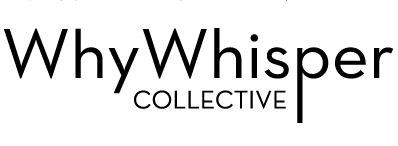by Shanley Knox
I joined the WhyWhisper team after four years of work as a social entrepreneur.
WhyWhisper gives me a place to pass along the lessons I learned in branding a social enterprise. After riding the highs and lows of running a business on my own, WhyWhisper gives me opportunities to work for social change while also being a part of a community. And as a freelancer who, in any given month, can find herself working from East Africa, California, or New York City, WhyWhisper gives me a digital platform to consistently call my home.
As I work with other companies and causes, I’ve discovered that we share more than the goal of building an impactful brand. We share the often inspiring, but sometimes disparaging, journey along the way.
So, here are a few things I've learned that have nothing do to with how clickable a campaign will be, but have everything to do with working for social change.
It’s Going to Be Different Than You Think
When I started Nakate Project in Uganda, I thought I would be linking artisans in rural villages to skills training in urban areas, so as to generate local sales. Two years later, I was working to promote female-led Ugandan businesses in international markets. At first, I balked when I saw that change needed to happen. But I began to learn, over time, that the ability to pivot within your business is the only way to effectively find a model that creates impact.
It’s Going to Take Longer Than You Think
I thought I’d see marked results within a few weeks. I wanted large, measurable impact. If somebody told me it would be years until I began to feel the satisfaction of seeing actual change, I might have quit right then and there. I didn’t want to have to go through the painful building phase where I had to keep seeing the unmet needs of our target population, and feel humbled by my lack of power. What I learned along the way is that systemic change runs a long, painstaking course, and social entrepreneurs experience setbacks, obstacles, discouragement, and failed efforts.
It’s Going to Be Harder Than You Think
I knew cognitively that pushing social change in Uganda would be hard. I knew it would be long hours, and not a lot of pay, but I didn’t know that it would hurt. I hadn’t yet processed that real change involves the willingness to push through social and societal norms. It means being the odd woman (or man) out. It means saying things that people don’t like to hear, and working to explain why systems should be shifted. Sometimes, it means leaving parts of your business or work behind when it's no longer in line with your vision. All of it is emotional, personal, and often painful. I’ve come to understand that this is part of what makes social change so worthwhile -- good things never come easy.
You’re Going to Change More Than You Think
I was a different girl when I started Nakate. The business, in itself, has pushed me to my limits. It’s humbled me. It’s exhilarated me. It’s given me a platform to write, to speak, to meet people across the globe, and to discover an entirely new home for myself in East Africa. At some point, I realized that I hardly recognized myself. The experience of living so far out of my comfort zone had pushed me to become someone new.
It’s Going to Be More Rewarding Than You Think
I wanted to quit Nakate a hundred times on a hundred different days, but I didn’t. And I’m grateful for that, every single day. That’s because my social enterprise didn’t just teach me how to persevere, run a business in a another culture, or afford me the determination and vision to continue pushing through my failures and mistakes. It taught me how to fight for what I love. It taught me to believe in my work, and to have enough humility to change when I discovered it may be faulty.
Every day I sign in to begin my work for our clients at WhyWhisper, I bring gratitude with me -- gratitude for all that I’ve been taught in my own journey, and gratitude to have found a community at WhyWhisper where I can walk alongside others as they embark on a similar journey.

